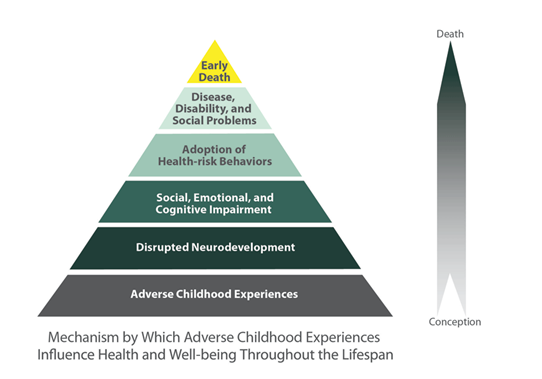Adverse Childhood Events Trauma
Adverse Childhood Events Trauma is finally beginning to be part of a wider conversation about the effect of childhood experience on mental and physical health. Twenty years ago, the US CDC sponsored a large scale, epidemiological study on the effects of what the study called Adverse Childhood Events (ACE) on health and behaviour in adulthood. These two articles in Psychology Today look at, first the effects of ACE on brain function, health and behaviour and, second, the ways in which people affected by ACEs can help themselves and be helped by therapists.
What are ACEs?
The study grouped events into three categories: Abuse (emotional, physical, sexual), Household Challenge (violence, divorce, substance abuse) and Neglect (emotional, physical).
Physical and Mental Impact
This is not only about impact on mental health: the study shows that the correlation of number of ACEs with a range of physical conditions is very strong. The first article discusses how this link between childhood trauma and adult disease comes about. The ACE Pyramid below summarises the relationships:
Major findings of the study are:
“Adverse Childhood Experiences (ACEs) are common. Almost two-thirds of study participants reported at least one ACE, and more than one in five reported three or more ACEs.
The ACE score, a total sum of the different categories of ACEs reported by participants, is used to assess cumulative childhood stress. Study findings repeatedly reveal a graded dose-response[1] relationship between ACEs and negative health and well-being outcomes across the life course.”
As the number of ACEs increases so does the risk for the conditions including:
| Alcoholism and alcohol abuse | Chronic obstructive pulmonary disease |
| Depression | Fetal death |
| Health-related quality of life | Illicit drug use |
| Ischemic heart disease | Liver disease |
| Poor work performance | Financial stress |
| Risk for intimate partner violence | Multiple sexual partners |
| Sexually transmitted diseases | Smoking |
| Suicide attempts | Unintended pregnancies |
| Early initiation of smoking | Early initiation of sexual activity |
| Adolescent pregnancy | Risk for sexual violence |
| Poor academic achievement |
Is This Common?
The study found that nearly two thirds of participants had experienced at least one ACE and almost 20% reported 3 or more. If anything the demographics were skewed toward the more affluent. 75% of participants had at least some university education and almost 40% had graduated with a degree.
In my practice almost all clients, couples and individuals report at least one ACE. Some of the event types are severe, some less so. All have left their mark with particular impact on overall happiness and ability to thrive in their intimate relationships. The most common effect is a more or less profound feeling of pain, distress, inadequacy, ….
The Good News
The second article discusses a variety of ways in which we can moderate the effects including writing to ourself about our experiences, mindfulness meditation, yoga. Where the emotional effects feel too much to handle alone, there are now a range of trauma aware therapies which can make major changes to our felt self experience. My recent training, for example, has been in how to do effective therapy with folks who have experienced multiple and prolonged ACEs resulting in complex childhood trauma.
Does This matter to You?
If you feel chronically unhappy, anxious, depressed, angry, often with no immediately apparent cause; if you find regular difficulties in your relationship with your partner or in your work or family relationships; if you have difficulty regulating eating, gambling, drinking or substance use: then it may very well matter to you.
If any of these sound distressingly familiar then answer the ace-questionnaire. If you would like help in dealing with chronic unhappiness or relationship disturbances then please contact me for a ten minute chat to see if we might work together to help you improve your situation.
[1] “Dose-response describes the change in an outcome (e.g., alcoholism) associated with differing levels of exposure (or doses) to a stressor (e.g. ACEs). A graded dose-response means that as the dose of the stressor increases the intensity of the outcome also increases.” CDC

